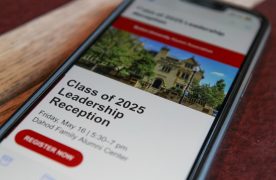If you’re anything like me, you are very picky when it comes to television. The number of times I have tried to watch a generally “popular” show and then lost interest is remarkable. I can never fully invest in a show because I usually lose interest too early on, the plot takes too long to develop or I can not relate to the characters. However, the new Netflix series “Ginny and Georgia” had me hooked from the beginning.

“Ginny and Georgia” centers around a mother and daughter duo. Both characters are alpha females and dominate their school and work environments, respectively. The show does an amazing job at creating such unique and easily relatable characters.
Although there is a clear emphasis on the show’s main mother-daughter relationship, the amount of complex relationships between characters is abundant.
I found myself rooting for characters at times, and then only a couple of episodes later absolutely hating them. Like the time Hunter Chen started tap dancing in the hallway of their public high school. I cringed while watching the rest of the season and I don’t know if Hunter can redeem himself after that.
The character development in this show is different from others because it defies normal timing: The pilot starts “in medias res,” or in the middle of things, and then specific plot lines and characters are explained through a series of flashbacks.
Perhaps my favorite thing about this show is the not-so-subtle way it brings up politically charged content. In many reviews, the show is grilled about the execution of these touchy subjects. I think that is ridiculous. Is there room for improvement? Of course. However, the directors tried to do something here and at the very least started a conversation despite the backlash from TV critics.
In a Teen Vogue article, a critic describes it as “a messy show with a first half that’s packed to the brim with racist microaggressions — and that wouldn’t be a bad thing if the show actually engaged with most of them.”
I do not disagree with this critique, but I think this is the whole point of the show and very much intentional on the director’s part. In the current political climate, you do not accidentally drop “racist microaggressions” in your script. The show didn’t engage with these themes to the extent that critics and some other viewers expected, which is reflective of how microaggressions actually play out in real life.
I was never under the impression that “Ginny and Georgia” was a show about the way things should be. It is realistic. Of course, the characters and overlapping storylines are dramatized and intense — it’s a show after all.
That being said, I can see how they correspond with people who went to my high school and people that age in general. It is not good or bad, it just is. I think this was the directors’ intention — to start having conversations, relating to characters and working toward fixing these problems. It is not a director’s responsibility to solve complex political issues.
How this show reflects the behavior of kids in high school highlights these issues and allows viewers to relate to the characters. This is the first step in working toward change. More specifically, it increases awareness about these issues because it acknowledges their existence and prevalence.













